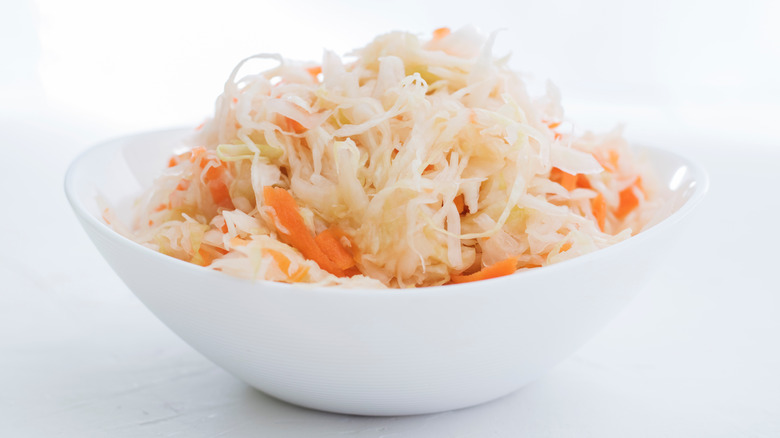Surprising Health Benefits Of Sauerkraut
You might have seen it on a hot dog or as a side dish at a German restaurant. But sauerkraut is so much more than a condiment. The name is German and translates roughly to "sour cabbage". Which, if you've never tried it, is a pretty accurate name. It is sour, flavorful, and absolutely delicious.
Sauerkraut is made using fine-cut cabbage, salt, and seasonings which are combined and then left to ferment. The end result is a delicious topping for savory meals. But even better, it's a topping with a couple of fantastic health benefits.
Some, like improved digestion and help with weight loss, come from the cabbage itself. Cabbage is naturally high in fiber and that doesn't change when it is fermented. The FDA states that one cup of sauerkraut has about four grams of fiber and only 27 calories. This makes it an ideal menu addition for people trying to lose weight because the fiber creates a sense of satiety, while the lower calorie count still keeps your intake low enough to create a deficit (via Harvard Health Publishing).
Fiber is also key to digestion, as explained by WebMD. The fiber we eat helps our bodies process everything else we consume. When our bodies have taken what they need from the food, that same fiber then makes it easier for us to clear out the waste. Both effects keep our digestive system running smoothly. And when it comes to sauerkraut, fiber isn't the only boost it gives our digestive system. The other boost, along with the food's biggest benefits, all come down to the outcome of the fermentation process.
Probiotic benefits
For the last few years, probiotics have been all the rage. They've popped up on store shelves and in yogurt commercials. But you don't need supplements or endorsed dairy products to get probiotics into your diet. You do, however, need fermented foods. And sauerkraut is an excellent choice.
When cabbage ferments, it creates strains of probiotics. Livestrong explains that the specific type of probiotic found in sauerkraut is lactic acid bacteria or LAB. This specific strain has been found to offer a number of benefits, according to a 2016 paper in the Functional Foods in Health and Disease. These benefits include eliminating both diarrhea and constipation, an effect helped by the food's fiber content, and boosting a person's immune response.
Another study published a few years earlier in The Cochrane Database of Systematic Review supports the finding that probiotics, in general, can boost immune response. This boost results in lower rates in a variety of infections, including yeast infections and UTIs. And it means that when someone does get sick, they get better faster, a benefit also found during a 2014 study published in the British Journal of Nutrition.
If sauerkraut isn't already part of your diet, then it will take a little time to get used to it. A good place to start is by adding it to hot dogs or bratwurst when you eat them, in keeping with the German tradition. From there, you can branch out and try it with new meals. It's a little more work when dinner time rolls around. But all those probiotic benefits and the boost to your digestive system are definitely worth it.


